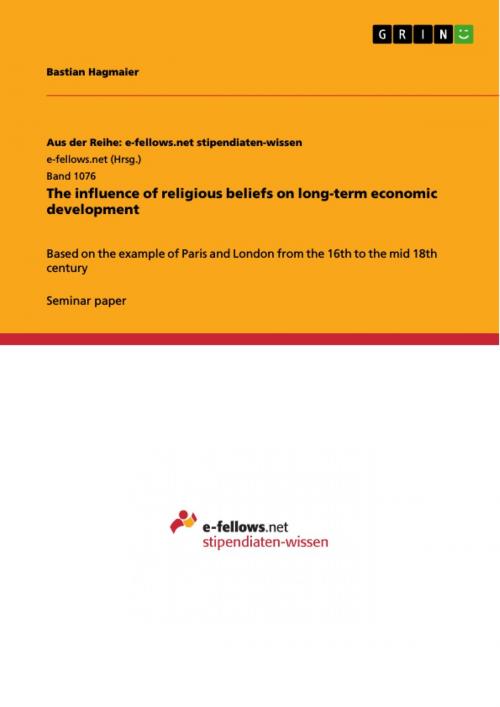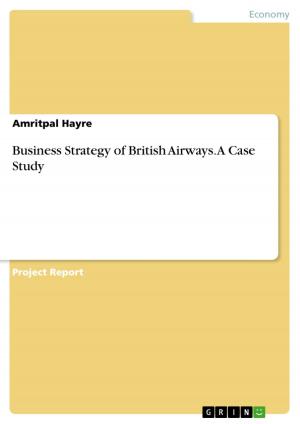The influence of religious beliefs on long-term economic development
Based on the example of Paris and London from the 16th to the mid 18th century
Nonfiction, History, European General| Author: | Bastian Hagmaier | ISBN: | 9783656866725 |
| Publisher: | GRIN Publishing | Publication: | December 23, 2014 |
| Imprint: | GRIN Publishing | Language: | English |
| Author: | Bastian Hagmaier |
| ISBN: | 9783656866725 |
| Publisher: | GRIN Publishing |
| Publication: | December 23, 2014 |
| Imprint: | GRIN Publishing |
| Language: | English |
Seminar paper from the year 2013 in the subject History Europe - Other Countries - Middle Ages, Early Modern Age, grade: 1,3, Leuphana Universität Lüneburg, course: The Two Sides of the Coin-Economics and Ethics in Anglo-American Writing, language: English, abstract: This historical analysis will examine the influence that religious beliefs have on long-term economic developments, which are shown using the example of Europe at the height of the Renaissance and on its way towards Industrialisation, between 1500 and 1750. This relationship will be examined on the basis of two specific cities, the mainly catholic French capital, Paris, and the Protestant English city London. During this time, the whole of Europe was undergoing huge changes in all dimensions of society. The protestant reformation began in the 16th century, quickly followed by the foundation of the Church of England which then also leads over to the English reformation. Only a few decades later the Thirty Years War broke out in Germany as well as the English Civil War taking place in the middle of the 17th century. One main indicator of this new direction of development are the rising and falling wages across all nations. While most of the traditional catholic southern countries go in a phase of regression, most protestant cities are flourishing and gaining more and more importance. This leads to the point of rating religion in this process. The religious group a society belongs to influences their individual behaviour. According to Weber's 'Protestant Ethic' being of protestant belief is an advantage compared to catholic ethics, especially in terms of economic development. This dependence is analysed based on two major cities Paris and London as they both have quite a high population as well as remarkably different evolution during this time.
Seminar paper from the year 2013 in the subject History Europe - Other Countries - Middle Ages, Early Modern Age, grade: 1,3, Leuphana Universität Lüneburg, course: The Two Sides of the Coin-Economics and Ethics in Anglo-American Writing, language: English, abstract: This historical analysis will examine the influence that religious beliefs have on long-term economic developments, which are shown using the example of Europe at the height of the Renaissance and on its way towards Industrialisation, between 1500 and 1750. This relationship will be examined on the basis of two specific cities, the mainly catholic French capital, Paris, and the Protestant English city London. During this time, the whole of Europe was undergoing huge changes in all dimensions of society. The protestant reformation began in the 16th century, quickly followed by the foundation of the Church of England which then also leads over to the English reformation. Only a few decades later the Thirty Years War broke out in Germany as well as the English Civil War taking place in the middle of the 17th century. One main indicator of this new direction of development are the rising and falling wages across all nations. While most of the traditional catholic southern countries go in a phase of regression, most protestant cities are flourishing and gaining more and more importance. This leads to the point of rating religion in this process. The religious group a society belongs to influences their individual behaviour. According to Weber's 'Protestant Ethic' being of protestant belief is an advantage compared to catholic ethics, especially in terms of economic development. This dependence is analysed based on two major cities Paris and London as they both have quite a high population as well as remarkably different evolution during this time.















